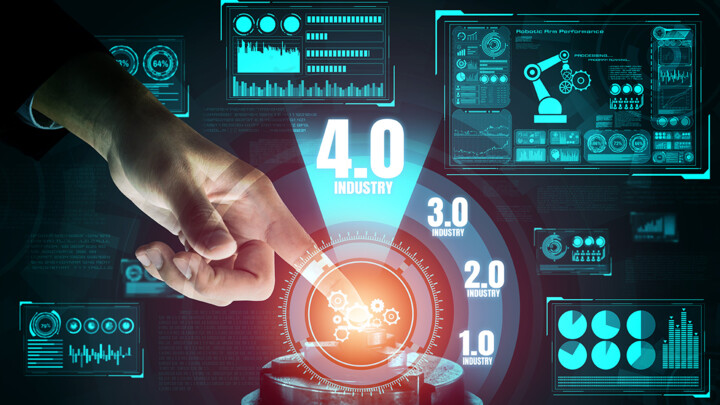More Turnover and Better Margins With Machine Services in the SME Sector
Nils Klute, eco Association, looks at how data-based as-a-service business models help modern plants solve production problems and minimize risks.

© NanoStockk | istockphoto.com
Computers, sensors and networks are moving closer to machines. What makes data-based as-a-service business models possible is interesting precisely because modern plants no longer just solve production problems, but minimize risks. Why machines today must be more than the sum of their parts. And what that means for industrial service.
Whether Pan Am, Atari or Bell – in 1982, the Blade Runner film included brands that were considered immortal at the time. Director Ridley Scott wanted to give his work a timeless look that would last for years. A goal that backfired badly: Pan Am flew into bankruptcy in 1991. The so-called Video Game Crash brought Atari down. A year after the film was released, the oversaturated market, flooded with similar computer games to Atari’s, sounded the death knell for the company.
The future of many world-famous brands from the plant engineering sector is as uncertain as these three from the classic dystopian film, according to the management and strategy consultancy Bain. Especially because a flooded and saturated machine market makes products increasingly interchangeable. Just like the big companies featured in the science fiction flick, the conglomerates are threatened with disintegration. Why so? In times when customers are asking for individual mass products, specialized production equipment is required. A trend that an industry that is used to earning money with rigid hardware is struggling with. This is a development that the lack of raw materials, faltering supply chains and unreliable advanced services is further forcing in these uncertain times, as the Bain report Thinking Outside the Machine notes.
Services in mechanical engineering: More than the sum of all components
For the experts, one thing is certain: Today, it is almost impossible to earn money with machines and plants alone. Every piece of industrial hardware becomes a commodity that has to function. An everyday example is how people who ride a lift are usually not interested in the manufacturer’s brand. What counts is that the lift arrives at its destination. A fact that makes premium car manufacturers sweat. And a fact that also applies to the equipment used in the factories to screw, weld and assemble car bodies. Whether it’s a lift, a car or a factory robot – if manufacturers want to remain successful, every product today must be more than the sum of its interchangeable components. The strategy paper states: “Growing competition and slowing device-centric innovation have made it more challenging to maintain profitable growth and to differentiate the business based on machine performance alone.”
Renting instead of buying: Machinery, equipment and services in the SME sector
What is crucial: Modern value creation relies on software and data. Both make machines interoperable, add specific functions to them and ensure that capital goods pay off in the longer term – i.e. beyond the once-off revenue. Rolls Royce shows what this can look like. Instead of selling engines and marketing maintenance contracts, the manufacturer now offers aircraft engines and services on a subscription basis. The after-market service “Total Care” maintains, repairs and exchanges on the basis of fixed prices per flight hour. “Data from Internet-of-Things (IoT) sensors gives Rolls-Royce extensive and deep insights into the performance of its own products,” writes the online specialist portal BigData-Insider. Data that Rolls Royce uses to develop new services for its customers, for example to reduce spare parts costs, shorten down time and save fuel.
Solve problems and minimize risks with software and data
Whether jet engines for jets or rotor blades for helicopters – it’s the same for manufacturing robots. While their developers used to invest most of their work in the mechanics, today more and more time is spent on the software: “The takeaway is that even the most technologically advanced machines aren’t safe from disruption”. As a result, IT is advancing in the machinery and plant engineering sector and making as-a-service business models the core of the offering. Data-based services that are interesting precisely because they not only solve the problems of the clientele, but also minimize risks. If, for example, a manufacturer of beverage packaging is not paid per carton but on a pro-rata basis per refreshment sold, this may still sound unusual at the moment, but it will soon no longer be a dream of the future. “Outcome-based and other advanced service models are expected to grow to 30% of machinery companies’ total services revenue by 2024, triple the share in 2019, according to Bain survey data.”
Industry Service 4.0: New technologies require new know-how
Minimizing down time, reducing spare parts costs, renting equipment and subscribing to as-a-service services – what makes customers happy makes machine and plant manufacturers rethink industrial services.
Because where data, software and services enter the business model, sensors, networks and computers move closer to the machines. Technologies that require new know-how and tools to support technicians. Service-Meister is no different: The project tests how knowledge can be digitized and made available via artificially intelligent (AI) tools exactly where service staff need it. For example, Trumpf and USU are working in the Service-Meister consortium to make expert know-how available around the globe in the same quality. What supports and facilitates repairs step by step can also close skills gaps: AI tools from Service-Meister are also designed to empower less-trained professionals for complex tasks.
The Bain consultants also firmly believe that the successful plant manufacturers of the future will not only rely on data- and service-based business models, but will also ensure that the necessary technological service know-how is cultivated digitally. Those who offer their customers well-engineered complete solutions have more turnover and better margins with machine services.
Nils Klute is Project and Communication Manager at EuroCloud Germany. He is responsible for content marketing activities on topics such as Gaia-X and AI, supports initiatives such as Service-Meister, EuroCloud Native or systems integrators on their cloud journey. Prior to his start at eco in 2019, Nils worked as a corporate journalist for IT corporations (like SAP, T-Systems, and QSC at Cologne-based communication agency Palmer Hargreaves) and previously held public relations positions at market and economic research institutions.
Please note: The opinions expressed in Industry Insights published by dotmagazine are the author’s own and do not reflect the view of the publisher, eco – Association of the Internet Industry.





